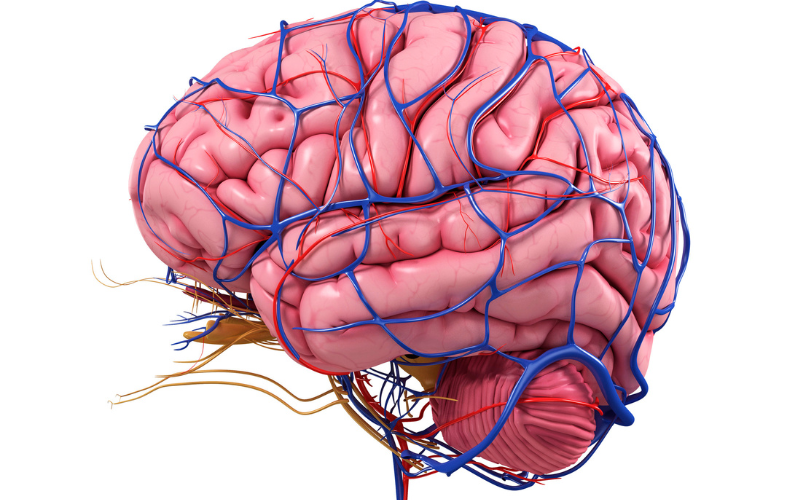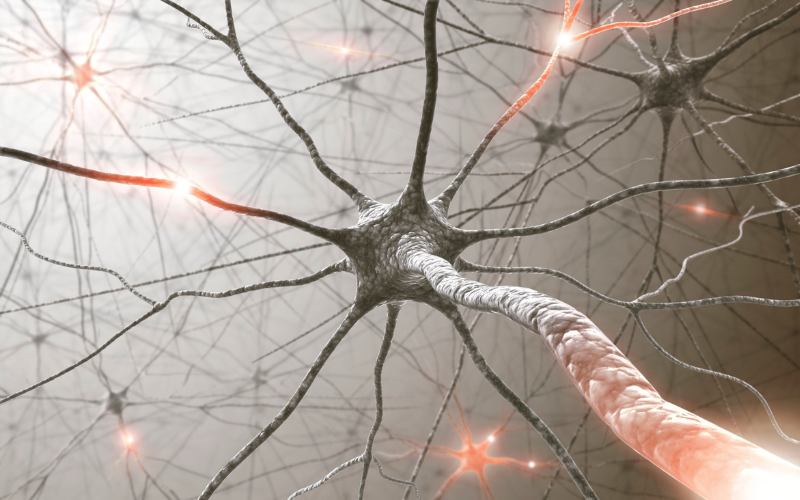The brain, the true conductor of our body, plays a crucial role in the proper functioning of our faculties and vital systems. Like a house, where each room has a specific role, the brain ensures that each function - physical and mental - is harmoniously regulated. To maintain this harmony, it is essential to keep our "command center" in optimal working condition. However, this cleaning and maintenance process does not happen visibly. This is where the glymphatic system comes in, responsible for eliminating waste and toxins accumulated in our brain.
In this article, we will explore:
- the nervous system and the glymphatic system,
- understand how stress and other factors such as harassment can disrupt them,
- and discover natural and effective ways to support these systems daily, emphasizing the importance of a good night's sleep and the use of certain plants.
1. The Nervous System: The Command Center of Your Body
What is the Nervous System?
The nervous system is a collection of cells and circuits that allows you to think, feel, move, and react. It includes the brain, the spinal cord, and all the nerves branching throughout your body. Think of it as the computer network that connects all parts of your house and allows you to control them.
Support Rather Than "Clean"
Unlike other body systems that can clean themselves through excretory organs - like the liver which detoxifies or the kidneys which filter waste - the nervous system, and particularly the brain, does not benefit from this type of direct mechanism. This means we cannot really intervene by performing exercises or quick methods to "clean" the brain. It needs regular maintenance and favorable conditions to stay healthy. This support involves:
- A good diet that provides the necessary nutrients.
- Physical exercise that helps improve circulation.
- Effective stress management to prevent the brain from being overloaded.
- Quality sleep, essential for the brain to regenerate.

2. Stress, Alzheimer's Disease, Harassment, and Their Effects on the Brain
How Does Stress Affect the Brain?
The Long-Term Effects of Stress
Chronic stress not only disrupts the immediate functioning of the brain; it can also have long-term consequences, including:
- Decrease in memory and learning: Stress can impair our ability to store and retrieve information, making learning difficult.
- Emotional problems: Anxiety and depression are often exacerbated by prolonged exposure to stress.
- Impact on decision-making: Stress can affect our judgment and make us more impulsive or indecisive, as the brain often prioritizes emotional responses over rational thinking.
- Weakening of resilience: Stressed individuals may become less able to cope with daily challenges, adapt to changes, and manage their emotions effectively.
The impact of Alzheimer's disease
Among the most common neurodegenerative diseases, Alzheimer's disease is a form of progressive dementia that has devastating effects on the brain. It leads to the degradation of neurons and the formation of amyloid plaques, thereby reducing cognitive abilities and affecting memory, thinking, and even emotions. Studies show that chronic stress can accelerate this process, increasing the risk of developing this neurodegenerative disease. Imagine a library where books represent our memories. Alzheimer's disease acts like a flood that gradually damages this library, making the books unreadable and thus undermining our ability to remember.
The impact of bullying
Bullying, whether moral or physical, is a source of intense and repeated stress. This continuous pressure particularly affects brain regions such as the hippocampus (involved in memory) and the prefrontal cortex (involved in decision-making). It's as if a person is subjected to violent gusts of wind every day that slowly erode a wall. Over time, the wall (your brain) weakens and may eventually crack.
Research on ADHD
Attention Deficit Hyperactivity Disorder (ADHD) is also a concern in the context of brain health. Recent research indicates that stress can worsen ADHD symptoms in children and adults. We can distinguish 2 types of ADHD, the first neurological and the other called reactive, appearing after one or more traumas. Chronic stress can disrupt attention and concentration regulation systems. Thus, understanding and supporting our nervous system becomes essential not only to prevent and also overcome Alzheimer's disease but also to manage conditions like ADHD.
3. The glymphatic system: your brain's cleaning service
What is the glymphatic system?
Discovered in 2013 by researcher Maiken Nedergaard, the glymphatic system is a mechanism that helps the brain get rid of waste accumulated during the day. It functions similarly to a sewage system or a cleaning service, but inside your head.
How does it work? While you sleep, this system circulates a special fluid called cerebrospinal fluid. This fluid captures waste and transports it to areas where it can be eliminated.
Supporting our nervous and glymphatic systems
To ensure the well-being of our nervous and glymphatic systems, several strategies can be implemented:
Adopt a healthy lifestyle
- Regular Sleep: Prioritize regular and restorative sleep to promote the proper functioning of the glymphatic system.
- Balanced Diet: A diet rich in omega-3 fatty acids, antioxidants, and vitamins can support brain health.
- Physical Exercise: Regular physical activity helps reduce stress and improve our mood.
Stress Management Techniques
- Meditation and Controlled Breathing: Practicing meditation or deep breathing exercises can reduce stress levels and thus protect our nervous system.
- Therapy and Emotional Support: Seeking psychological support during difficult times can encourage mental resilience.
Conclusion: Understanding the functioning of our nervous and glymphatic systems is essential for maintaining our cognitive and emotional health. By incorporating healthy lifestyle strategies and actively managing stress, we can support these vital systems and improve our quality of life. Ultimately, the link between body and mind is fragile but incredibly powerful, a reality that each of us can learn to master for a better future.
Why is sleep so important?
The glymphatic system is particularly active during deep sleep. Good sleep is therefore essential to allow your brain to "clean" itself effectively. To illustrate, think of your home: after a long day, a deep cleaning is necessary to put everything in order. Similarly, sleep allows your brain to tidy up and start fresh the next day.
The Effects of Sleep Deprivation and Lack of Sleep
Lack of sleep or sleep deprivation has profound and negative consequences on cognitive and physical health. Here are some of the most notable effects:
- Accumulation of brain waste: When we do not sleep enough, the glymphatic system cannot function properly. This means that metabolic waste, including toxic proteins linked to conditions like Alzheimer's, accumulates in the brain.
- Disruption of cognitive functions: A lack of sleep can quickly lead to concentration difficulties, memory problems, and impaired decision-making. Neuronal connections suffer, preventing effective information processing.
- Increase in anxiety and stress: Sleep deprivation can increase levels of anxiety and stress, creating a vicious cycle that can lead to mood disorders and increased mental fatigue.
- Impact on physical health: In addition to its effects on the brain, lack of sleep can also weaken the immune system, increase the risk of heart disease, and contribute to obesity.
In short, to promote the proper functioning of our nervous and glymphatic systems, it is crucial to ensure optimal sleep quality. Regular and restorative sleep is a fundamental pillar not only for brain health but also for overall well-being.

4. How to support your brain daily
Adopt good lifestyle habits
- Have restorative sleep
- Try to go to bed and wake up at the same time every day.
- Create a calm, dark, and cool environment to promote deep sleep.
- Some studies even suggest that sleeping position, such as sleeping on your side, can help the glymphatic system function better.
- Eat and hydrate well
- A diet rich in fruits, vegetables, and omega-3s (found in certain seeds) helps nourish brain cells.
- Drinking enough water is essential for cerebrospinal fluid to circulate properly.
- Exercise regularly
- Exercise improves blood circulation, which helps the glymphatic system and strengthens your overall health.
- Even a daily walk can make a big difference.
- Manage stress
- Activities like meditation, yoga, or simply taking a few minutes to breathe deeply can help reduce stress.
- It is important to take breaks and find moments of relaxation in your day.
5. Allopathy and plants to support your brain
The importance of intervening in case of emergency
It is evident that in case of emergency related to sleep disorders, it is crucial to break this vicious cycle. Medications like sleeping pills or melatonin supplements can help temporarily break the cycle of insomnia. However, these treatments should be considered for a short duration and under medical supervision, as they are not without consequences on the body and can alter other bodily functions.
Gemmotherapy: A natural approach
A less conventional but equally interesting approach is gemmotherapy, which uses the buds and young shoots of plants. Among these remedies, two stand out for their soothing and regulatory properties:
- The Fig Tree (Ficus carica): Known for its relaxing effects, the fig tree helps soothe anxiety and promotes restorative sleep. Its action on the nervous system can help reduce accumulated tensions and thus facilitate falling asleep.
- Linden (Tilia spp.): Linden, often used in the form of herbal tea, is renowned for its calming properties. In gemmotherapy, its extract can help regulate stress and promote a state of relaxation, essential for good sleep quality. It is interesting to note that the combined use of fig tree and linden can enhance their beneficial effects, thus providing overall support to the nervous system.
By incorporating plants in various forms such as herbal teas, capsules, or mother tinctures into your routine, accompanied by good lifestyle practices, you can create an environment conducive to brain health and the efficiency of your glymphatic system.
Here is a selection that has already proven itself:
- Bacopa monnieri
Used in India to improve memory and concentration, this plant helps strengthen brain plasticity, that is, its ability to adapt and repair.
- Ginkgo biloba
Known for promoting blood circulation, it helps bring more oxygen and nutrients to brain cells. It's a bit like ensuring that all departments of your house receive their energy supply.
- Turmeric (Curcumin)
Turmeric is famous for its anti-inflammatory and antioxidant properties. It helps protect brain cells against damage caused by oxidative stress.
- Ashwagandha (Withania somnifera)
An adaptogenic plant that helps reduce stress by regulating cortisol levels. It can help your brain better manage periods of tension.
- Rhodiola rosea
This plant is known to combat fatigue and improve concentration, particularly useful during periods of intense stress or long workdays.
Tips for using herbal medicine:
Before starting a herbal treatment, it is recommended to consult a healthcare professional, especially if you are already taking other medications. Choose quality products, preferably standardized extracts that ensure a consistent concentration of active ingredients. It is important to emphasize that herbal medicine is a long-term aid, to be considered in the medium term, aiming not only to relieve a temporary symptom but to promote overall bodily balance. Thus, it should be introduced as part of a holistic approach, complementing a healthy diet, regular physical activity, and effective stress management.

Conclusion
Your brain, this precious command center, deserves all your attention and care. Rather than trying to "clean" it as you would a filter, it is about supporting and maintaining it daily.
- The nervous system functions better when it is nourished by a healthy diet, regular exercise, and quality sleep.
- The glymphatic system, your brain's cleaning service, operates mainly during deep sleep, highlighting the importance of restorative rest, a good night's sleep, and sufficient sleep hours.
- Stress management, whether through relaxation techniques or regular breaks, helps prevent the brain from constantly being in "emergency" mode.
- Herbal medicine offers natural solutions to enhance memory and concentration, and reduce the harmful effects of stress on the brain.
By adopting these good habits, you give yourself the best chance to preserve your brain health and improve your daily well-being. Think of your brain as a garden that needs regular maintenance to bloom and stay healthy. Take care of it, and it will reward you well!











